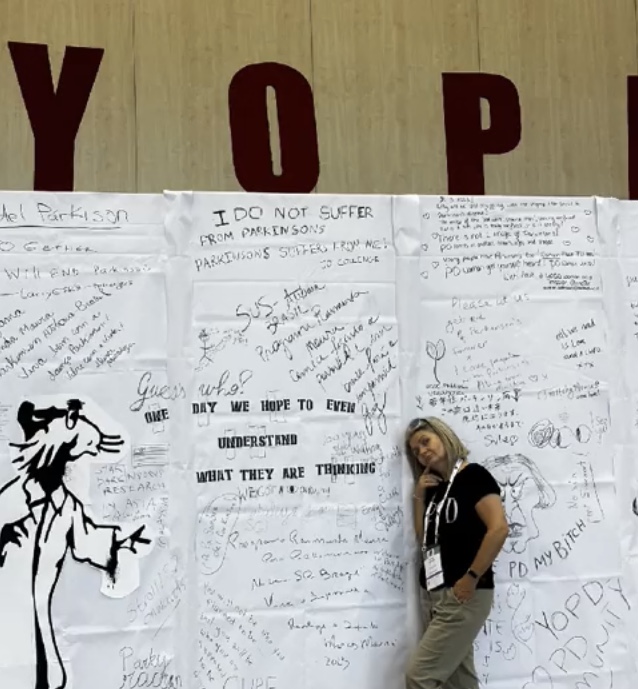An interview with Gaynor Edwards from Spotlight YOPD: Young onset Parkinson’s comes of age – and not before time! on December 29, 2023 by George Ackerman, Ph.D, J.D.
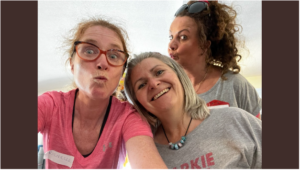
Gaynor with Richelle Flanagan and Vicki Dillon at a Parkinson’s Sport event.
Biography
Gaynor was diagnosed at the age of 42 in 2012. She had symptoms for four or five years in advance, notably depression, insomnia, and a frozen shoulder.
At the time of her diagnosis, she was running two businesses – a vintage store and a PR/marketing agency in southern England. She ‘came out’ in her company newsletter under the headline ‘Charity Begins At Home’. Within three months she had relocated to the beach and downsized her business – becoming a freelance marketing consultant.
Having made attempts to collaborate with the leading UK Parkinson Charity, it became clear (at the time) that they had little interest in YOPD.
The fact that it was a separate condition was then, and to some degree remains, the worst kept secret in Neurology. The patients all complained of similar symptoms, but these were not the symptoms they were asked about by their consultants – who were in many cases geriatricians.
This was one of several very good reason to launch Spotlight YOPD – the first charity globally to represent the needs of Young onset Parkinson’s patients.
Spotlight YOPD was finally registered in January 2016. Self-funded, Gaynor rocked up at the WPC in Portland, with a clutch of slogan T-shirts and some stick-on tattoos – for anyone that kept still long enough (easy targets within the Parkinson’s community).
Please tell me a little about your background.
I left for my hometown of Clacton-on-Sea at the age of 18 to train as a journalist. I spent a little over a decade in the capital, employed as an editor of in-store magazines and trade titles, predominantly for the music and video industries.
At the age of 30 I took a career break – travelling for ten months around Australia. Returning to the UK, I worked as a sub-editor and headline writer for a local daily newspaper in Southampton.
Recurring wanderlust later found her working for a British-owned PR company in Southern Spain. Returning to the UK, I set up my own PR and marketing company, based in Tunbridge Wells.
I launched some events to promote the area and creative industries in the town. Then in October 2012, I was diagnosed with Young onset Parkinson’s. A few months later I downsized my business interests and relocated to the seaside. The plan was to reduce stress and walk the dog on the beach; a move which proved beneficial to YOPDer and canine companion.
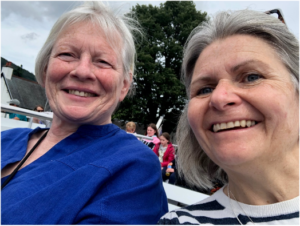
Gaynor (left) with Joy Milne – the lady who smells PD – on Loch Ness. A cure for PD often seems as elusive as the Loch Ness Monster.
Can you tell me more about your organization?
Gaynor co-founded Spotlight YOPD with the late Alex Flynn – a YOPD adventurer. Tragically Alex died during an attempt to climb Everest – several years after he had ceased to be involved with the charity.
As the first and original registered charity specifically for Young onset Parkinson’s globally, Spotlight YOPD has had a presence at the last three WPCs – in Portland, Kyoto and Barcelona. In Summer 2023, Gaynor and several Spotlight YOPD trustees created and managed a YOPD graffiti wall – one of many ways of giving the younger PD community a chance to have their say.
Spotlight worked with MP Nick Thomas-Symonds in 2017 to have YOPD debated in the UK Parliament – in the House of Commons.
Spotlight has taken part in numerous online and offline discussions and meetings, collaborating with partner organizations across the globe.
The first guest to be invited to appear on ‘Movers and Shakers’, Gaynor was also the only non-American to be a regular member of the Davis Phinney Foundation YOPD council.
In September 2023 Gaynor resigned as CEO and took up a role as Patron of the Spotlight YOPD, while handing over the day-to-day running of the charity to Carl Beech. “I think Beechy, with his experience in the charity sector and seemingly boundless energy is the perfect Parkie to take Spotlight to the next level.” she says.
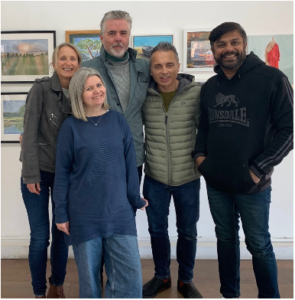
What is your passion and how did you get involved in Parkinson’s awareness and hope for a cure?
YOPD seemed so obviously different and yet so under the radar. It would have been harder to ignore the condition than to thrust it into the ‘spotlight’.
We need to dig deeper into potential causes before having any expectations of a cure. It seems unlikely that such a variable condition with many different symptoms will have a single cure.
What type of goals do individuals with Parkinson’s have when working with you?
When YOPDers first come into contact with Spotlight YOPD, they appreciate that the Young Onset community has a different disorder or syndrome. Many feel that they have finally found ‘their tribe’.
Many find it refreshing to be working with others with genuine insight and shared knowledge of their condition – in order to enlighten, educate and hopefully make a real difference to community and society as a whole.
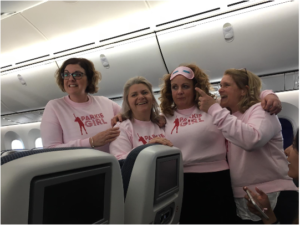
What effect can it have on an individual with Parkinson’s?
It’s a big deal when you find someone with similar symptoms at a similar age. YOPDers often keep their diagnosis a secret, making them even more isolated than the rare diagnosis would alone. Meeting someone else your age in a similar situation provides an invaluable and comforting perspective.
What would you like to see as a future goal for your programs?
The new CEO Carl has lots of great plans which Gaynor is keen to support but wouldn’t give away any spoilers for us here.
Spotlight YOPD fills the gap – perhaps asking the questions that maybe are a little bit more left-field than some of the more established charities.
“We’ve never taken any money from pharma and so have no fear of rattling cages, if necessary,” says Gaynor.

What events do you participate in?
Spotlight YOPD will always try to have a presence at any event that’s of use or interest to the YOPD community. We recently held a YOPD conference in Canterbury that addressed some of the more unusual topics including how AI could impact on neurology and Cannabis as a therapy.
As mentioned already, we are big fans of the WPC and try to work with and support other charities and their work. This had included events such as Parkinson’s Eve and Spork Parkinson’s Triathlon.
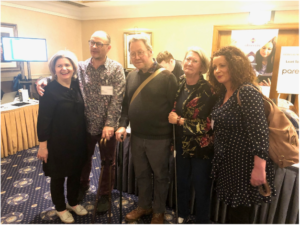
How does this also assist the caregivers?
Anywhere that YOPDers gather you will usually find at least some (caring) partners. Those diagnosed with the condition are emotionally boosted by the company of their ‘tribe’ who have a similar understanding of their daily challenges,
Those vicariously living with the condition benefit from meeting their own tribe of carers. Give them the space and safety to have an open conversation among themselves and the permission to put their own needs first is an invaluable service.
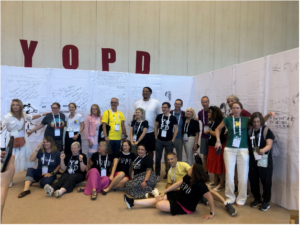
Some of the YOPD community in Barcelona at the World Parkinson Congress.
How can someone get in touch? What is your website?
Our website spotlightYOPD.org includes many ways to make contact and ‘spotlightYOPD’ can be found on various social media platforms.
How can others also become advocates for awareness?
We are obviously happy to have volunteers work with Spotlight YOPD; we are all volunteers – no one is paid a wage, not even the CEO. Anyone who wants to help can make contact via the website.
More generically there are many ways that people can advocate for those with Young Onset Parkinson’s. YOPDers themselves can advocate by not being afraid to show their symptoms in public. requesting help or greater patience in their day-to-day life – perhaps by asking a supermarket cashier to slow down in order for the YOPDer to keep up. Most cashiers will not only happily do this – but will also help pack the bags.
Is there any difference between Early Onset and Young Onset Parkinson’s?
Depending upon where you get your info from – Early Onset used to refer to people diagnosed under 40 and Young Onset was those under 50. It’s a moot point whether there is an official definition of YOPD. Orphanet gave the condition rare disease status and have for years used YOPD. This seems to be the preferred form for the patient community too.
More recently the MDS – or specifically a group of 16 neurologists and/or neuroscientists that formed their ‘task force’ looking at what to name the condition have decided (not unanimously) to adopt EOPD – Early Onset.
We were invited to give our views – and did so. For the record we thought YOPD should stay, with the long form meaning Younger Onset Parkinson Disorders.
Gaynor bumped into one of the ‘giants’ of PD research in Barcelona at the WPC and asked his view. “He told me that he didn’t care what it was called – we just need to cure it. While I concur with the sentiment and have always been happy to use both Young and Early… there are some very good reasons to use YOPD and Young rather than EOPD or Early,” she says.
Social media in a bid to be concise often refer to ‘Early PD’ – but is that understood to mean ‘early stage’ of ‘early age’?.
Meanwhile EOPD can be easily confused with EUPD – meaning ‘emotionally unstable personality disorder’; potentially a Parkinson’s non-motor symptom – adding to the confusion.
Many believe that patients and the neuro professionals already speak different languages (aside from scientific English). The patient community appears to be sticking with YOPD. Gaynor questions whether the ‘Movement Disorder Society’ are best placed to decide on the nomenclature of this condition, which includes so many non-motor symptoms.
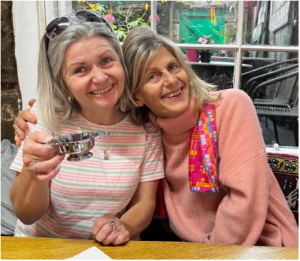
Gaynor (left) and Gillan Lacey-Solymar, the only female and YOPD voice of podcast Movers and Shakers.
In your opinion what is the key to effective advocacy?
Authenticity – tell it and show it like it is. And if you can insert a little humor into your story, so much the better.
How can we better fundraise to support a cure for Parkinson’s?
There is an argument that perhaps we should look more closely at how funds are currently spent and the research that takes place. We question the credibility of some academic papers and the ‘pay to get into print’ model.
What other activities do you undertake to help improve and support your daily living Eg exercise and alternative remedies?
Minimize stress, walk the dog by the sea, try to be social and keep in contact with friends, take a probiotic and a magnesium supplement.
Why should people who don’t have Parkinson’s care about this?
Parkinson is a growing global problem – impacting on an increasing number of people of all ages. Sooner or later most people will have a friend or family member with a PD diagnosis – if not being diagnosed themselves.
Have you had any family members or relatives affected by Parkinson’s disease?
In later life my dad – who was Schizophrenic – suffered with drug-induced Parkinsonism.
If you had one final statement or quote you could leave for the Parkinson’s community, what would it be?
Know yourself, know your Parkinson’s. Ask the right questions and find the right help. Stay positive and have hope.
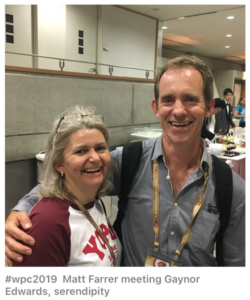
Gaynor meets Professor Matt Farrer in Kyoto at WPC.

